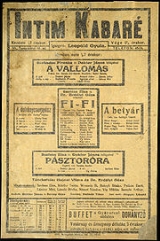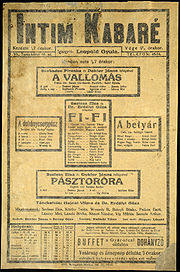
Miklós Vig
Encyclopedia
Miklós Vig was a Hungarian
cabaret and jazz singer, actor, comedian and theater secretary in the 1920s, 30s and 40s. Born in Budapest
on July 11, 1898, he was murdered there on December 19, 1944 by members of the Arrow Cross
.
family in Budapest
, Hungary
. Although he went to acting school, he had better success as a cabaret
singer. In 1924 as his career was picking up he changed his surname to Vig. He changed his name because Voglhut was a Jewish-sounding name and antisemitism was growing at the time. Vig means cheerful or merry; it is a nice, short, typically Hungarian name that also made a great stage name.
A nephew of Miklós Vig, Dr. John R. Vig, was president of the IEEE
in 2009.
, members of the Arrow Cross Party
. The Shoes on the Danube Promenade
honors the memory of those who were murdered in this fashion.
 He was a student of Géza Boross and his talent was discovered by Dezső Gyárfás and Antal Nyáray.
He was a student of Géza Boross and his talent was discovered by Dezső Gyárfás and Antal Nyáray.
He had his first major successes at the Intim Kabaré as a soloist, and later performed frequently in other cabarets including the Budapest Operetta Theatre and Budapest Orfeum. Although he made many recordings, he became most famous as a singer of popular music on the radio. A 1935 article in Színházi Élet describes Miklós as a singer of popular sentimental songs.
According to Gramofon (the Hungarian Jazz and Classical music magazine) Miklós was considered part of the first generation of recorded Hungarian musicians. When Deutsche Gramophone found themselves falling behind the competition, they signed Miklós who ultimately became their first dance-music star "beloved all around the country."
As a comedian, he performed in the early 1920s at various cabarets including the Rakéta Kabaré - occasionally with female partner Annus Nagy.
Hungary
Hungary , officially the Republic of Hungary , is a landlocked country in Central Europe. It is situated in the Carpathian Basin and is bordered by Slovakia to the north, Ukraine and Romania to the east, Serbia and Croatia to the south, Slovenia to the southwest and Austria to the west. The...
cabaret and jazz singer, actor, comedian and theater secretary in the 1920s, 30s and 40s. Born in Budapest
Budapest
Budapest is the capital of Hungary. As the largest city of Hungary, it is the country's principal political, cultural, commercial, industrial, and transportation centre. In 2011, Budapest had 1,733,685 inhabitants, down from its 1989 peak of 2,113,645 due to suburbanization. The Budapest Commuter...
on July 11, 1898, he was murdered there on December 19, 1944 by members of the Arrow Cross
Arrow Cross Party
The Arrow Cross Party was a national socialist party led by Ferenc Szálasi, which led in Hungary a government known as the Government of National Unity from October 15, 1944 to 28 March 1945...
.
Early life
He was born Miklós Voglhut in 1898 to a Hungarian JewishHistory of the Jews in Hungary
Hungarian Jews have existed since at least the 11th century. After struggling against discrimination throughout the Middle Ages, by the early 20th century the community grew to be 5% of Hungary's population , and were prominent in science, the arts and business...
family in Budapest
Budapest
Budapest is the capital of Hungary. As the largest city of Hungary, it is the country's principal political, cultural, commercial, industrial, and transportation centre. In 2011, Budapest had 1,733,685 inhabitants, down from its 1989 peak of 2,113,645 due to suburbanization. The Budapest Commuter...
, Hungary
Hungary
Hungary , officially the Republic of Hungary , is a landlocked country in Central Europe. It is situated in the Carpathian Basin and is bordered by Slovakia to the north, Ukraine and Romania to the east, Serbia and Croatia to the south, Slovenia to the southwest and Austria to the west. The...
. Although he went to acting school, he had better success as a cabaret
Cabaret
Cabaret is a form, or place, of entertainment featuring comedy, song, dance, and theatre, distinguished mainly by the performance venue: a restaurant or nightclub with a stage for performances and the audience sitting at tables watching the performance, as introduced by a master of ceremonies or...
singer. In 1924 as his career was picking up he changed his surname to Vig. He changed his name because Voglhut was a Jewish-sounding name and antisemitism was growing at the time. Vig means cheerful or merry; it is a nice, short, typically Hungarian name that also made a great stage name.
Family
Other musicians from the Vig family include saxophone and clarinet player György Vig (brother) and jazz musician Tommy Vig (nephew).A nephew of Miklós Vig, Dr. John R. Vig, was president of the IEEE
Institute of Electrical and Electronics Engineers
The Institute of Electrical and Electronics Engineers is a non-profit professional association headquartered in New York City that is dedicated to advancing technological innovation and excellence...
in 2009.
Murder
The fact that he was married to a Catholic woman, Kati Szőke, and the fact that he changed his name did not save him from the Holocaust. On December 19, 1944, Miklós was among a group of Jews who were bound, lined up along the banks of the Danube and machine-gunned into the river by Hungarian NazisNazism
Nazism, the common short form name of National Socialism was the ideology and practice of the Nazi Party and of Nazi Germany...
, members of the Arrow Cross Party
Arrow Cross Party
The Arrow Cross Party was a national socialist party led by Ferenc Szálasi, which led in Hungary a government known as the Government of National Unity from October 15, 1944 to 28 March 1945...
. The Shoes on the Danube Promenade
Shoes on the Danube Promenade
The Shoes on the Danube Promenade is a memorial created by Gyula Pauer and Can Togay on the bank of the Danube River in Budapest. It honors the Jews who fell victim to fascist Arrow Cross militiamen in Budapest during World War II, and represents their shoes left behind on the bank when they fell...
honors the memory of those who were murdered in this fashion.
Music and Comedy

He had his first major successes at the Intim Kabaré as a soloist, and later performed frequently in other cabarets including the Budapest Operetta Theatre and Budapest Orfeum. Although he made many recordings, he became most famous as a singer of popular music on the radio. A 1935 article in Színházi Élet describes Miklós as a singer of popular sentimental songs.
According to Gramofon (the Hungarian Jazz and Classical music magazine) Miklós was considered part of the first generation of recorded Hungarian musicians. When Deutsche Gramophone found themselves falling behind the competition, they signed Miklós who ultimately became their first dance-music star "beloved all around the country."
As a comedian, he performed in the early 1920s at various cabarets including the Rakéta Kabaré - occasionally with female partner Annus Nagy.
Discography
| Date of Release | Title | Label |
| Délután mosogatás után | Polydor | |
| 1929 | Egyszer voltam a bálban... | Polydor |
| 1938 | Én nem tudom már, hogy minek becézzelek... | Radiola |
| 1929 | Éppen csak a szivem fáj | Polydor |
| 1929 | Éva keringö | Polydor |
| 1929 | Gyöngyvirág | Polydor |
| 1938 | Hallod te ló... | Radiola |
| Hogy is tudtam eddig élni nélküled | ||
| Illúzió a szerelem | ||
| 1929 | Jönnél te még... | Polydor |
| 1929 | Lesz-e párom már a nyáron? | Polydor |
| 1929 | Madridban | Polydor |
| 1929 | Majd ha újra sírni tudsz... | Ervé |
| 1929 | Messze van a Mester ucca | Polydor |
| 1931 | Minden ugy lesz, ahogy te kivánod | Polydor |
| Minden veréb tudja | Polydor | |
| Mondd, nem kívánsz te túl sokat | ||
| 1929 | Mostanában mind a bárban... | Ervé |
| Őszi Fekete fellegek | ||
| 1931 | Sose jön egy szebb | Polydor |
| 1929 | Szép volt... | Polydor |
| 1929 | Szeresd a régi muzsikát | Polydor |
| 1929 | Szervusz | Polydor |
| Szibill levele | ||
| 1938 | Szombat vasárnap | Radiola |
| 1930 | Szomorú nyárfalevél | Polydor |
| 1929 | Tarka Lepkém | Polydor |
| Tubicám | Polydor | |
| Valamit a kis fülébe | Polydor | |
| 1929 | Valami van magában... | Polydor |
| 1930 | A vén Tabánban | Polydor |
| 1929 | Vig Miklósnak jó kedve van | Polydor |
| 1929 | A Volga rabja (Ey uchnjem)... | Polydor |

